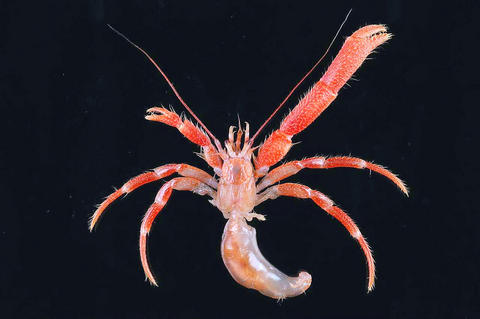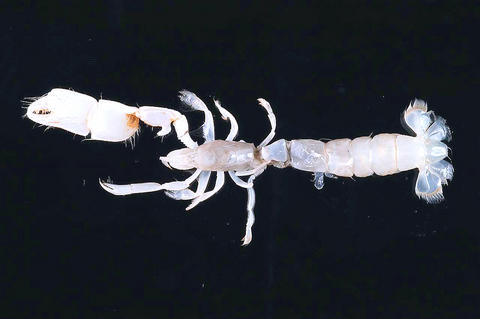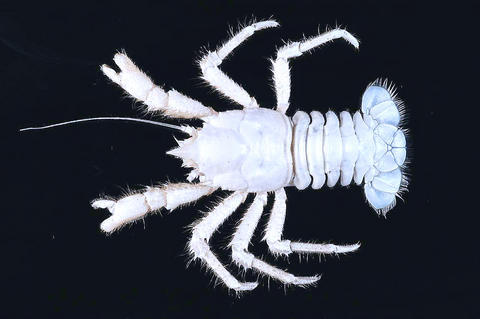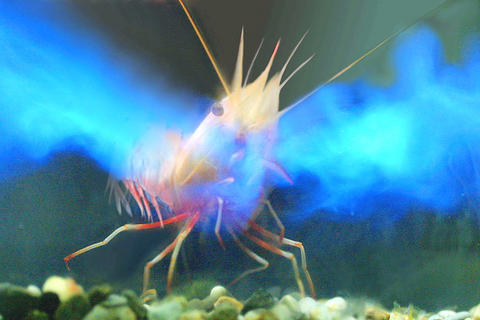Eighty previously unknown species of crustaceans and other marine life were discovered off Taiwan's eastern seaboard and in the South China Sea near Taiwan by researchers from local universities and research organizations, with assistance from France's Musee national d'Histoire naturelle and Japanese researchers.
Starting in 2001, with funding from the National Science Council, researchers from the National Taiwan Ocean University, Academia Sinica, National Chung Hsing University, the National Museum of Natural Science and other domestic and foreign institutions plumbed the depths of the Pacific Ocean near Taiwan with the help of a steel cable, nets and other collecting devices.
What they found astonished even seasoned marine biologists.

PHOTOS: COURTESY OFO CHEN TIEN-JEN
"Taiwan is surrounded on all sides by water rich in marine resources," National Taiwan Ocean University professor Chen Tien-jen (
Not anymore. Thanks to sophisticated new devices, the six-year exploration project was able to reach depths of 4,455m, allowing researchers to haul up from the cold, black waters rarely seen or previously unknown species, Chen said.
In all, 603 types of rare shrimp, fish and other crustaceans hitherto unseen in waters off Taiwan were discovered.

Named after Taiwan
Of that figure, 80 species were previously unknown. Five of the new species, including fish, shrimp and crabs, were given official names with the word "Taiwan" in them.
With 71 sub-species, Taiwan boasts the greatest variety of "grenadier," a prehistoric-looking deep-sea fish with razor-sharp teeth, of which there are 350 sub-species worldwide.

Taiwan also boasts the greatest variety of "squat lobsters," with 31 sub-species out of the 218 identified worldwide making their home deep in the waters off the country's east coast, he said.
While most countries shun Taiwan at the political level, its newly discovered marine biodiversity is attracting research organizations in droves, with plans to include the nation in other research projects, Chen said.
"Taiwan's rare biodiversity is something Taiwanese should be proud of and cherish," he said.


Tropical Storm Gaemi strengthened into a typhoon at 2pm yesterday, and could make landfall in Yilan County tomorrow, the Central Weather Administration (CWA) said yesterday. The agency was scheduled to issue a sea warning at 11:30pm yesterday, and could issue a land warning later today. Gaemi was moving north-northwest at 4kph, carrying maximum sustained winds near its center of up to 118.8kph and gusts of 154.8kph. The circumference is forecast to reach eastern Taiwan tomorrow morning, with the center making landfall in Yilan County later that night before departing from the north coast, CWA weather forecaster Kuan Shin-ping (官欣平) said yesterday. Uncertainty remains and

SEA WARNING LIKELY: The storm, named Gaemi, could become a moderate typhoon on Wednesday or Thursday, with the Taipei City Government preparing for flooding A tropical depression east of the Philippines developed into a tropical storm named Gaemi at 2pm yesterday, and was moving toward eastern Taiwan, the Central Weather Administration (CWA) said. Gaemi could begin to affect Taiwan proper on Tuesday, lasting until Friday, and could develop into a moderate typhoon on Wednesday or Thursday, it said. A sea warning for Gaemi could be issued as early as Tuesday morning, it added. Gaemi, the third tropical storm in the Pacific Ocean this typhoon season, is projected to begin moving northwest today, and be closest to Taiwan on Wednesday or Thursday, the agency said. Today, there would likely

DISRUPTIONS: The high-speed rail is to operate as normal, while several airlines either canceled flights or announced early departures or late arrivals Schools and offices in 15 cities and counties are to be closed today due to Typhoon Gaemi, local governments announced last night. The 15 are: Taipei, New Taipei City, Taoyuan, Tainan, Keelung, Hsinchu and Kaohsiung, as well as Yilan, Hualien, Hsinchu, Miaoli, Chiayi, Pingtung, Penghu and Lienchiang counties. People should brace for torrential rainfall brought by the storm, with its center forecast to make landfall on the east coast between tonight and tomorrow morning, the Central Weather Administration (CWA) said. The agency issued a sea warning for the typhoon at 11:30pm on Monday, followed by a land warning at 11:30am yesterday. As of

CASUALTY: A 70-year-old woman was killed by a falling tree in Kaohsiung as the premier warned all government agencies to remain on high alert for the next 24 hours Schools and offices nationwide are to be closed for a second day today as Typhoon Gaemi crosses over the nation, bringing torrential rain and whipping winds. Gaemi was forecast to make landfall late last night. From Tuesday night, its outer band brought substantial rainfall and strong winds to the nation. As of 6:15pm last night, the typhoon’s center was 20km southeast of Hualien County, Central Weather Administration (CWA) data showed. It was moving at 19kph and had a radius of 250km. As of 3pm yesterday, one woman had died, while 58 people were injured, the Central Emergency Operation Center said. The 70-year-old